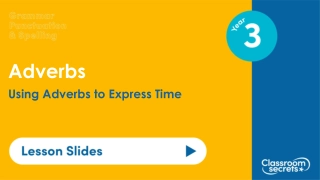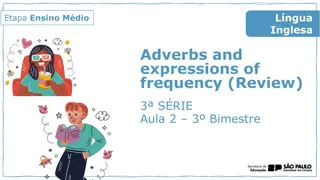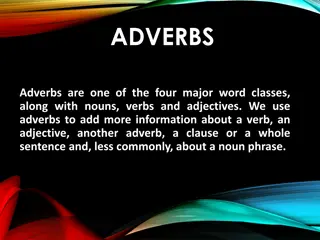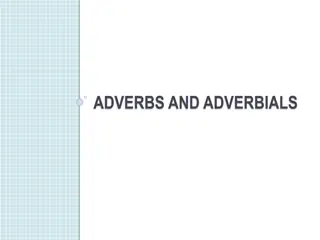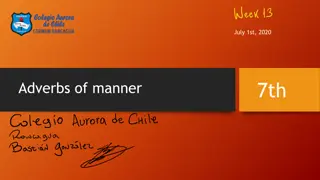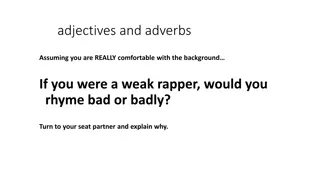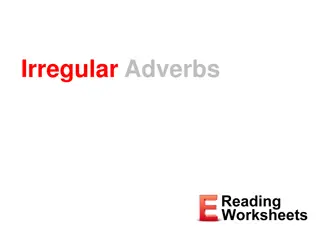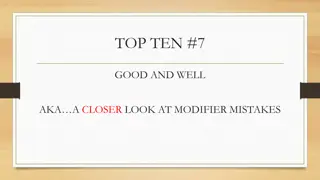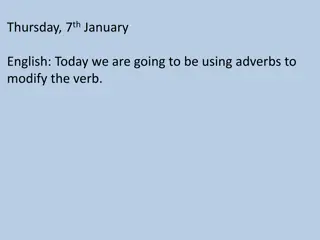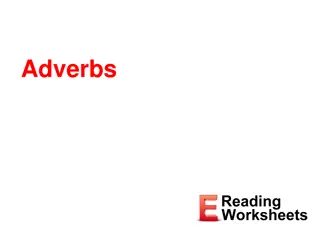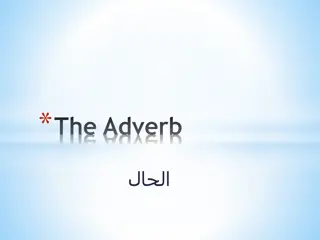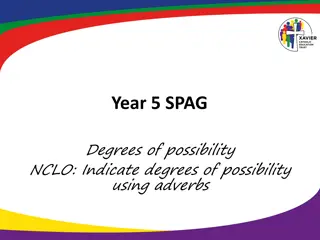Understanding Adverbs in English Grammar
Delve into the world of adverbs with this presentation created by Stephens Luke Malaker, Principal of PRAN-RFL PUBLIC SCHOOL. Learn about how adverbs modify verbs, adjectives, and other adverbs. Explore examples and understand the various ways adverbs can modify verbs. Discover the position of adverbs when modifying verbs and how they are formed. Enhance your knowledge of adverbs in English grammar through this detailed presentation.
Download Presentation

Please find below an Image/Link to download the presentation.
The content on the website is provided AS IS for your information and personal use only. It may not be sold, licensed, or shared on other websites without obtaining consent from the author. Download presentation by click this link. If you encounter any issues during the download, it is possible that the publisher has removed the file from their server.
E N D
Presentation Transcript
Adverbs Stephens Luke Malaker Principal PRAN-RFL PUBLIC SCHOOL Olipur, Hobigonj Cell: 01887670767 Presentation made for Class ten English 2nd paper Grammar
Adverbs That Modify Verbs Adjectives are words that modify nouns and pronouns. Adverbs are another type of modifier. They modify verbs, adjectives, and other adverbs. An adverb is a word that modifies a verb, an adjective, or another adverb.
What Adverbs Modify? VERBS: People handle old violins carefully. ADJECTIVES: Very old violins are valuable. ADVERBS: Orchestras almost always include violins. An adverb may tell how or in what manner an action is done. It may tell when or how often an action is done.
It may also tell where or in what direction an action is done.
Ways Adverbs Modify Verbs Ways Adverbs Modify Verbs Adverbs tell Examples grandly, easily, completely, neatly, gratefully, sadly How soon, now, immediately, often, never, usually, early When here, there, everywhere, inside, downstairs, above, far Where
When an adverb modifies an adjective or another adverb, the adverb usually comes before the word it modifies. When an adverb modifies a verb, the adverb can occupy different positions in a sentence.
Position Of Adverbs Modifying Verbs Guests often dine at the White House. Before the verb Guests dine often at the White House. After the verb Often guests dine at the White House. At the beginning Guests dine at the White House often. At the end
Many adverbs are formed by adding ly to adjectives. However, not all words that end in ly are adverbs. The words friendly, lively, kindly, lovely, and lonely are usually adjectives. On the other hand, not all adverbs end in ly.
Some Adverbs Not ending In -LY afterward everywhere near short already fast never sometimes always forever not somewhere anywhere hard now soon away here nowhere straight below home often then even late outside there ever long seldom well
Adverbs Modifying Adjectives and Adverbs An adverb can also modify an adjective or another adverb. Notice how adverbs affect the meaning of the adjectives in the following sentences. Most often they tell how or to what extent. EXAMPLE: Harry Truman used extremely direct language. He became a very popular president.
In the first sentence, the adverb extremely modifies the adjective direct. Extremely tells to what extent Truman s language was direct. In the second sentence, the adverb very modifies the adjective popular. Very tells to what extent Truman was popular.
In the following sentences, adverbs modify other adverbs. EXAMPLES: Truman entered politics unusually late in life. He moved through the political ranks quite quickly. In the first sentence, the adverb unusually modifies the adverb late. Unusually tells how late Truman entered politics.
In the second sentence the adverb quite modifies the adverb quickly. Quite tells how quickly Truman moved through the ranks. When an adverb modifies an adjective or another adverb, the adverb almost always comes directly before the word it modifies. On the following page is a list of some adverbs that are often used to modify adjectives and other adverbs.
Adverbs Often Used To Modify Adjectives And Other Adverbs almost just rather too barely nearly really totally extremely partly so unusually hardly quite somewhat very
Comparative And Superlative Adverbs The comparative form of an adverb compares one action with another. The superlative form of an adverb compares one action with several others. Most short adverbs add er to form the comparative and est to form the superlative.
Comparing Adverbs With ER and -EST Comparative The pianist arrived earlier than the violinist. Superlative The drummer arrived earliest of all the players.
Long adverbs and a few short ones require the use of more and most. Comparing Adverbs With More And Most Comparative The violinist plays more often than the harpist. Superlative Which musicians play most often?
Some adverbs have irregular comparative and superlative forms. Irregular Comparative And Superlative Forms Base Form Comparative Superlative well better best badly worse worst little less least far (distance) farther farthest far (degree) further furthest
The words less and least are used before adverbs to form the negative comparative and superlative. EXAMPLES: I play less well. I play least accurately. Don t use more, most, less, or least before adverbs that already end in er or est.
Using Adjectives And Adverbs Sometimes it s hard to decide whether a sentence needs an adjective or an adverb. Think carefully about how the word is used. EXAMPLES: He was (careful, carefully) with the antique clock. He worked (careful, carefully) on the antique clock.
In the first sentence, the missing word follows a linking verb and modifies the subject, He. Therefore, an adjective is needed. Careful is the correct choice. In the second sentence, the missing word modifies the verb, worked. Thus, an adverb is needed, and carefully is the correct choice.
The words good and well and the words bad and badly are sometimes confused. Good and bad are adjectives. Use them before nouns and after linking verbs. Well and badly are adverbs. Use them to modify verbs. Well may also be used as an adjective to mean healthy : You look well today.
Telling Adjectives From Adverbs Adjective Adverb The band sounds good. The band plays well. The band sounds bad. The band plays badly. The soloist is well. The soloist sings well.
Use these modifiers correctly: real and really, sure and surely, most and almost. Real and sure are adjectives. Really, surely, and almost are adverbs. Most can be an adjective and adverb.
Telling Adjectives From Adverbs ADJECTIVE ADVERB Music is real art. This music is really popular. A pianist needs sure hands. Piano music is surely popular. Most pianos have eighty-eight keys. Piano strings almost never break.
Correcting Double Negatives The adverb not is a negative word, expressing the idea of no. Not often appears in a short form as part of a contraction. When not is part of a contraction, as in the words in the chart below, n t is an adverb.
Contractions With Not are not = aren t does not = doesn t should not = shouldn t cannot = can t had not = hadn t was not = wasn t could not = couldn t has not = hasn t were not = weren t did not = didn t have not = haven t will not = won t do not = don t is not = isn t would not = wouldn t
In all but two of these words, the apostrophe replaces the o in not. In can t both an n and the o are omitted. Will not becomes won t. Other negative words are listed in the following chart. Each negative word has several opposites. These are affirmative words, or words that show the idea of yes.
SOME NEGATIVE AND AFFIRMATIVE WORDS NEGATIVE AFFIRMATIVE never, scarcely, hardly, barely always, ever nobody anybody, everybody, somebody no, none all, any, one, some no one anyone, everyone, one, someone nothing anything, something nowhere anywhere, somewhere
Dont use two negative words to express the same idea. This is called a double negative. Only one negative word is necessary to express a negative idea. You can correct a double negative by removing one of the negative words or by replacing one of the negative words with an affirmative word.
EXAMPLES: INCORRECT: I don t have no homework. CORRECT: I have no homework. CORRECT: I don t have any homework.


